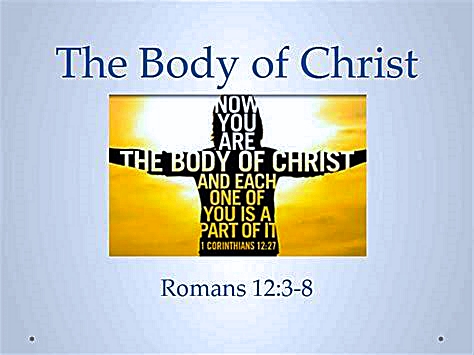Body Ministry – BT9: Church-Clergy blindness about what we do in Church services

Body Ministry – BT9: Church-Clergy blindness about what we do in Church services
Please follow the BLOG Etiquette to stay on topic and pass the moderator’s check. Bold, underlined text below = future links to the BLOG pages.
There is also a blindness in Church “leadership” about what the Church is actually supposed to do “when you come together” (a). Is it to open up with a 2 minute prayer? Is it to join in with a worship band for 4 songs or 20-30 minutes looking up at a screen? Is it to listen to 1 person speak to an audience for the rest of the time? Is it to end with a 2 minute blessing or prayer and finish the whole service up in an hour flat, so everybody can get to their favorite restaurant? Or repeat the whole thing over for 3-4 services on Sundays? I’ve played in 15 churches and that’s pretty much the routine! <Notes> a) 1 Corinthians 11:17-18, 20, 33-34, 14:26; cf. Ephesians 5:19; Colossians 3:16.
Let’s see what the New Testament says! In 1 Corinthians 11:17-34, Paul uses the phrase “when you come together” 5 times concerning the Lord’s Supper and their concurrent “agape love feast” – and based on 1 Corinthians 10:14-22 that they should diakrino ‘judge/critique thru-the-realizing-channel-of, thus to investigate/examine thoroughly back-and-forth’ the Body-of-Christ (the Church, not just the physical body of Jesus as we saw in the last BLOG) and not to just look out for their own individual needs. His 6th time is in 1 Corinthians 14:26 when Paul says: “What then is my conclusion, brethren? Whenever you come together, each/every one ongoingly has a psalm (a), ongoingly has a teaching, ongoingly has a revelation, ongoingly has a tongue (b), ongoingly has an [Spirit-given] interpretation [of the tongue]. I strongly urge you to let ALL things for building up be ongoingly done,” and the parallel passages of this koinonia fellowship sharing are Ephesians 5:19 and Colossians 3:16. When is the last time you went to a church service like that? But Paul is describing standard practice back then! <Notes> a) psalmos: “hit, twanged, plucked, or twitched” out songs with/without singing, b) glossa: supernatural Spirit-given language – see Grace-Gifts.
The order of my English translation is exactly that of the Greek, which shows the emphasis Paul is placing – what is in the beginning of a sentence is what is emphasized – that “each/every one” of them were to be contributing to “whenever you come together!” Paul is simply giving them some concluding action items for their standard gatherings after having talked much about a huge variety of the Spirit’s “appointed varieties of grace-gifts given into Christians, varieties of ministries/services through them to others, and varieties of effectual-energetically-workings in others” earlier in 1 Corinthians 12:5 that is ALL “for the common good” in v. 12:7. These grace-gifts are by definition “unmerited, unearned, and undeserved” (thus not natural talents) included “apostles, prophets, teachers, messages of wisdom, messages of knowledge, trusting-relying-faith (c), healing, miracles, helping-services, managed care-giving leading/supervising, discerning spirits, tongues, and interpretation” (a), because “though many parts,” they are still “one Body in Christ and individually members One of/belonging-to another (b). <Notes> a) 1 Corinthians 12:28, b) 1 Corinthians 12:12, cf. Romans 12:5, c) pistis: relational conviction of trusting reliance.
Certainly Paul wants them to “be well informed about the Spirit’s grace-gifts” (a), especially to “earnestly desire the more useful/advantageous/excellent (b) grace-gifts,” but sums up his urging: “earnestly pursue/hunt-down as even more excellent (huperbole) path/road (c) – unconditional, no-strings-attached agape unconditional-love (d) kai and/coupled zealously pursue the Spirit’s grace-gifts, especially that you may prophesy” (e). That’s Paul’s emphasis of Body-of-Christ interactions in 1 Corinthians chapters 12-14! He’s not even close to hinting in vv. 13:8-12 that any of the “varieties of grace-gifts, varieties of ministries/services, and varieties of effectual-energetically-workings” will “pass away” (g) during the Church age as the Cessasionists claim. <Notes> a) 1 Corinthians 12:1 – it’s pitiful so many churches want to remain ignorant, b) kreitton, c) v. 12:31, d) vv. 13:1-7, 13, 14:1, e) v. 14:1.
Instead, Paul is simply emphasizing that agape unconditional-love will “never end” (a) even after “the Perfect comes” – Christ (b), not a flawed Bible – see Bible Info, and so must remain the “greatest/larger/stronger of these [faith, hope, and love]” (c) during our community interactions in the Church age while we wait for Christ’s coming. They even remain in eternity! He’s not pitting the “pursuit of agape unconditional-love” against “zealously pursuing the Spirit’s grace-gifts, especially to prophesy!” In v. 14:1 Paul couples earnest-pursue . . . kai and/coupled zealously-pursue . . ” inseparably together with the conjunction of kai! <Notes> a) v. 13:8, b) v. 13:10; Jesus is the Perfect man per Hebrew 5:9, 7:28, 9:11, 4:15, the Holy and Righteous and True One per Acts 3:14; Mark 1:24; Luke 4:34; John 6:69; Acts 2:27, 13:35; 1 John 2:20; Revelation 16:5, c) v. 13:13.
The Cessationists, like the Church of Christ that I was saved in, the Baptists, Associate Reformed Presbyterians, and Presbyterian Church in America, don’t believe in the supernatural enabling-power and ongoing prophetic-rhema words of the Holy Spirit. They say that all of that died out with the apostles or the coming of the ‘perfect’ bible! They say that the Continuationism of the Lutheran, Methodist, Moravian, and Pentecostals is wrong, even though Tertullian’s writings around 200 AD attest to it flourishing, as do: Hippolytus between 170-236 AD, Clement of Alexandria between 150-215 AD, Origen between 185-254 AD, Cyprian around 258 AD, Ephraem Syrus between 306–373 AD, and even Augustine around 430 AD. The history of revival has also proved the Cessationists dead wrong! Could this be why Paul even warned against the Church against such suppression (a), and strongly urged to “zealously desire to prophesy and/coupled in possibility do not forbid speaking in tongues” (b)? How can churches “cherry pick” what they want to obey out of the NT? See also “Cessationism versus Continuationism” in www.wikipedia.org. <Notes> a) 1 Thessalonians 5:19, b) 1 Corinthians 14:39.
Paul does help clarify tongues versus prophesy to justify why prophecy is a “more useful/advantageous/excellent (d)” grace-gift (a) in a Church gathering – exactly because prophecy builds the Church [gathering] up, but tongues without interpretation only builds oneself up, being that it is private between you and God, where Paul says concerning this: “proseuchomai conversationally-praying or singing and giving thanks well enough, a mystery to yourself and others” (b). Because Paul “speaks in tongues more than them all” (c), he naturally “wants them ALL to speak in tongues, but even more to prophesy because prophesying is greater/larger/stronger (d) than speaking in tongues unless interpreted so that the Church may be edified (built up)” (e) – see also Grace-Gifts and Prophetic-rhema-word pages. <Notes> a) 1 Corinthians 14:5, b) vv. 14:2-5, 14-17, c) v. 14:18, d) kreitton, e) v. 14:5.
Unconditional-love is ALL about “benefiting others” (a), so “since you are eager for manifestations of the Spirit (as Paul certainly was), pros ‘moving toward the goal of’ the building up of the Church [I strongly-urge you] to ongoingly seek that you [should] ongoingly super-abound [at this]” (b). Paul sure isn’t against speaking in tongues or prophesying as many churches practice, but actually encourages both. But when it comes to people trying to communicate something to the church gathering, prophecy is preferable unless the tongues are interpreted. It’s simply a matter of logistics – people have to be able to hear and understand in order to benefit. That’s the context leading up to Paul’s concluding remarks of “What then is my conclusion, brethren? Whenever you come together, . . .Let all things be done for building up” (c). <Notes> a) 1 Corinthians 14:6, b) v. 14:12, c) v. 14:26.
Paul says to take turns with tongues/interpretation and prophecy because God isn’t about confusion but peace. Does that mean shut up or stop the praxis functioning of these grace-gifts as many churches have over-reacted? NO! Paul advises: “Let 2 or 3 prophets speak (a), and/coupled I strongly urge the others (b) ongoingly thoroughly-discriminate/investigate-with-it (c). But if to another [person] sitting, there is a revealing (via them prophesying) let the first [prophet] be silent, for you can ALL prophesy one by one in order that ALL may ongoingly learn (d) and/coupled ALL be ongoingly parakaleo alongside-encouraged (e) (f).” Prophetic interaction within the Body-of-Christ is what it’s all about! These aren’t just “speakers on stages with audiences watching” as a lot of churches have treated them, if they even allow – the Body-of-Christ is supposed to interact with them!
<Notes> a) remember the average house church held about 15-20 people max, b) in the house church of like-kind, thus spiritual Christians, c) diakrino: to judge thru-the-realizing-channel-of thoroughly, thus to investigate or discriminate thoroughly either rightly by close-reasoning or wrongly by going too far or vacillating back and forth, as determined by the context, d) manthano: “increase one’s knowledge, be informed, or hear or learn from”, e) parakaleo: a term often used of the Holy Spirit’s counseling, f) vv. 14:27-31.
Paul sums it up in 1 Corinthians 14:39-40, “I strongly urge you to ongoingly zealously burn/covet to prophesy and/coupled I strongly urge you to ongoingly absolutely not in possibility to forbid/hinder ongoingly speaking with tongues. But I strongly urge you that ALL things should be ongoingly done with respectful-form (a) and/coupled kata down-from/according-to taxis ‘specified an order of arrangement’.” Context has already defined “good form . . . order” as “without confusion, but one person after another,” so that ALL can benefit! This is basically an informal Robert’s Rules of Order – raise your hands before speaking, etc., of basic manners, politeness, and courtesy of genuine love for others. <Notes> a) decorously becoming, respectably, honorably, just as unconditional-love calls for.
Spiritual Education, Body Ministry, Church leadership equippers, Church leaders are the blind leading the blind, Blindness about format of church services, Modern churches don’t follow the biblical models, Body Ministry is to each bring something to share in Church services, Church services were to each share Spirit’s grace-gifts, The equippers are only coaches & facilitators NOT ministers, The saints are the ministers, Cessationism is historically false, We are to supremely pursue prophecy and strongly-desire tongues, Using our gifts builds the Body of Christ, Orderly worship services is prophets & tongues & other gifts taking turns, Orderly worship services is the other Spirit-kind people interacting with what is said, all the Spirit’s grace-gifts are to be used in the church services


